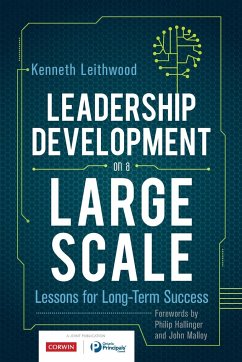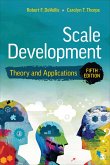Kenneth Leithwood (Canada University of Toronto)
Leadership Development on a Large Scale
Lessons for Long-Term Success
Kenneth Leithwood (Canada University of Toronto)
Leadership Development on a Large Scale
Lessons for Long-Term Success
- Broschiertes Buch
- Merkliste
- Auf die Merkliste
- Bewerten Bewerten
- Teilen
- Produkt teilen
- Produkterinnerung
- Produkterinnerung
This book addresses how to scale-up and sustain effective forms of leadership development over long enough periods of time to realize the positive effects on large numbers of students of improved school leadership.
Andere Kunden interessierten sich auch für
![The Sustained Shared Thinking and Emotional Well-being (SSTEW) Scale The Sustained Shared Thinking and Emotional Well-being (SSTEW) Scale]() Iram Siraj (University of Maynooth University of Oxford)The Sustained Shared Thinking and Emotional Well-being (SSTEW) Scale33,99 €
Iram Siraj (University of Maynooth University of Oxford)The Sustained Shared Thinking and Emotional Well-being (SSTEW) Scale33,99 €![Handbook of International Large-Scale Assessment Handbook of International Large-Scale Assessment]() Handbook of International Large-Scale Assessment156,99 €
Handbook of International Large-Scale Assessment156,99 €![The Movement Environment Rating Scale (MOVERS) The Movement Environment Rating Scale (MOVERS)]() Carol ArcherThe Movement Environment Rating Scale (MOVERS)33,99 €
Carol ArcherThe Movement Environment Rating Scale (MOVERS)33,99 €![Scale Development Scale Development]() Robert F. DeVellis (The University of North Carolina at Chapel HillScale Development81,99 €
Robert F. DeVellis (The University of North Carolina at Chapel HillScale Development81,99 €![Seven Steps to Effective Instructional Leadership Seven Steps to Effective Instructional Leadership]() Elaine K. McEwan-AdkinsSeven Steps to Effective Instructional Leadership41,99 €
Elaine K. McEwan-AdkinsSeven Steps to Effective Instructional Leadership41,99 €![Values for Educational Leadership Values for Educational Leadership]() Graham HaydonValues for Educational Leadership66,99 €
Graham HaydonValues for Educational Leadership66,99 €![How Leadership Works How Leadership Works]() Cathy J. LassiterHow Leadership Works46,99 €
Cathy J. LassiterHow Leadership Works46,99 €-
-
-
This book addresses how to scale-up and sustain effective forms of leadership development over long enough periods of time to realize the positive effects on large numbers of students of improved school leadership.
Hinweis: Dieser Artikel kann nur an eine deutsche Lieferadresse ausgeliefert werden.
Hinweis: Dieser Artikel kann nur an eine deutsche Lieferadresse ausgeliefert werden.
Produktdetails
- Produktdetails
- Verlag: SAGE Publications Inc
- Seitenzahl: 210
- Erscheinungstermin: 12. Oktober 2018
- Englisch
- Abmessung: 229mm x 152mm x 12mm
- Gewicht: 314g
- ISBN-13: 9781544342214
- ISBN-10: 1544342217
- Artikelnr.: 52819504
- Herstellerkennzeichnung
- Libri GmbH
- Europaallee 1
- 36244 Bad Hersfeld
- gpsr@libri.de
- Verlag: SAGE Publications Inc
- Seitenzahl: 210
- Erscheinungstermin: 12. Oktober 2018
- Englisch
- Abmessung: 229mm x 152mm x 12mm
- Gewicht: 314g
- ISBN-13: 9781544342214
- ISBN-10: 1544342217
- Artikelnr.: 52819504
- Herstellerkennzeichnung
- Libri GmbH
- Europaallee 1
- 36244 Bad Hersfeld
- gpsr@libri.de
Dr. Leithwood is Emeritus Professor at OISE/University of Toronto. His research and writing is about school leadership, educational policy and organizational change. He has published extensively on these topics. For example, he is the senior editor of both the first and second International Handbooks on Educational Leadership and Administration (Kluwer Publishers, 1996, 2003). His most recent books include How School Leaders Contribute to Student Success (2017, Springer), Linking Leadership to Student Learning (2012, Jossey Bass), Leading School Turnaround (2010, Jossey Bass), Distributed leadership: The state of the evidence (2009, Routledge), Leading with Teachers' Emotions in Mind (2008, Corwin), Making Schools Smarter (Corwin, 3rd edition, 2006) and Teaching for Deep Understanding (Corwin, 2006). Among his awards, Professor Leithwood is the inaugural recipient of the University of Toronto's Impact on Public Policy award, AERA (Division A) 2011 Outstanding Leadership Researcher Award, the 2012 Roald F. Campbell Lifetime Achievement Award from the University Council for Educational Administration and the Ontario Principal Councils' Outstanding Contributions to Education Award for 2016. He is a Fellow of the Royal Society of Canada. With colleagues, he has completed one of the largest studies of its kind about how state, district and school-level leadership influences student learning.
Foreword by Philip Hallinger
Foreword by John Malloy
Preface
Acknowledgments
About the Author
Chapter 1. The Leading Student Achievement: Networks for Learning Project
(LSA)
The Context
The Contributions of Leadership to Student Learning
A Brief History of the Leading Student Achievement Project
A Summary of LSA's Priorities for Improvement
Chapter 2. Evidence Used by LSA to Learn Its Way Forward
Phase 1: Comprehensive Assessment of Project Implementation and Outcomes
Phase 2: Targeting a Small Number of Key Priorities
Conclusion
Chapter 3. Building on a Shared Understanding of Effective School
Leadership
Successful Leadership Practices
Personal Leadership Resources
Conclusion
Chapter 4. LSA's Approach to Leadership Development
LSA's Initial Vision and Framework
Complementary Perspectives on LSA's Functions
LSA's Formal Professional Development Program
Conclusion
Chapter 5. Collaborative Inquiry
The Evolution of LSA's Approach to Collaborative Inquiry
Conclusion
Chapter 6. Key Learning Conditions: A Subject for Collaborative Inquiry
Key Learning Conditions
Initial Justification for Five Key Learning Conditions
LSA's Own Evidence About Key Learning Conditions
Conclusion
Chapter 7. LSA's Theory of Action and How It Was Developed
How LSA's Theory of Action Was Developed
The Four Paths Theory of Action
Empirical Test of the Four Paths Theory of Action
Conclusion
Chapter 8. Knowledge Building/Knowledge Creation: Education for a Knowledge
Society
The Motivation for Adopting Knowledge Building
Knowledge Building
Creating Interest in Knowledge Building and the Capacity for Implementation
The First Year of Knowledge-Building Implementation
The Second Year of Knowledge-Building Implementation
Conclusion
Chapter 9. Creating Useful Knowledge About Leadership Networks: Taking It
to the Next Level
Fundamental Assumptions About Learning in Networks
LSA's Research About the Characteristics of Effective Leadership Networks
Conclusion
Chapter 10. Insights About Leading Large-Scale Leadership Development
Projects
Four Practical Challenges in Sustaining LSA
One Large Technical Challenge: Assessing the Project's Impact on Students
Eleven Lessons About Effective Project Leadership
Conclusion
References
Index
Foreword by John Malloy
Preface
Acknowledgments
About the Author
Chapter 1. The Leading Student Achievement: Networks for Learning Project
(LSA)
The Context
The Contributions of Leadership to Student Learning
A Brief History of the Leading Student Achievement Project
A Summary of LSA's Priorities for Improvement
Chapter 2. Evidence Used by LSA to Learn Its Way Forward
Phase 1: Comprehensive Assessment of Project Implementation and Outcomes
Phase 2: Targeting a Small Number of Key Priorities
Conclusion
Chapter 3. Building on a Shared Understanding of Effective School
Leadership
Successful Leadership Practices
Personal Leadership Resources
Conclusion
Chapter 4. LSA's Approach to Leadership Development
LSA's Initial Vision and Framework
Complementary Perspectives on LSA's Functions
LSA's Formal Professional Development Program
Conclusion
Chapter 5. Collaborative Inquiry
The Evolution of LSA's Approach to Collaborative Inquiry
Conclusion
Chapter 6. Key Learning Conditions: A Subject for Collaborative Inquiry
Key Learning Conditions
Initial Justification for Five Key Learning Conditions
LSA's Own Evidence About Key Learning Conditions
Conclusion
Chapter 7. LSA's Theory of Action and How It Was Developed
How LSA's Theory of Action Was Developed
The Four Paths Theory of Action
Empirical Test of the Four Paths Theory of Action
Conclusion
Chapter 8. Knowledge Building/Knowledge Creation: Education for a Knowledge
Society
The Motivation for Adopting Knowledge Building
Knowledge Building
Creating Interest in Knowledge Building and the Capacity for Implementation
The First Year of Knowledge-Building Implementation
The Second Year of Knowledge-Building Implementation
Conclusion
Chapter 9. Creating Useful Knowledge About Leadership Networks: Taking It
to the Next Level
Fundamental Assumptions About Learning in Networks
LSA's Research About the Characteristics of Effective Leadership Networks
Conclusion
Chapter 10. Insights About Leading Large-Scale Leadership Development
Projects
Four Practical Challenges in Sustaining LSA
One Large Technical Challenge: Assessing the Project's Impact on Students
Eleven Lessons About Effective Project Leadership
Conclusion
References
Index
Foreword by Philip Hallinger
Foreword by John Malloy
Preface
Acknowledgments
About the Author
Chapter 1. The Leading Student Achievement: Networks for Learning Project
(LSA)
The Context
The Contributions of Leadership to Student Learning
A Brief History of the Leading Student Achievement Project
A Summary of LSA's Priorities for Improvement
Chapter 2. Evidence Used by LSA to Learn Its Way Forward
Phase 1: Comprehensive Assessment of Project Implementation and Outcomes
Phase 2: Targeting a Small Number of Key Priorities
Conclusion
Chapter 3. Building on a Shared Understanding of Effective School
Leadership
Successful Leadership Practices
Personal Leadership Resources
Conclusion
Chapter 4. LSA's Approach to Leadership Development
LSA's Initial Vision and Framework
Complementary Perspectives on LSA's Functions
LSA's Formal Professional Development Program
Conclusion
Chapter 5. Collaborative Inquiry
The Evolution of LSA's Approach to Collaborative Inquiry
Conclusion
Chapter 6. Key Learning Conditions: A Subject for Collaborative Inquiry
Key Learning Conditions
Initial Justification for Five Key Learning Conditions
LSA's Own Evidence About Key Learning Conditions
Conclusion
Chapter 7. LSA's Theory of Action and How It Was Developed
How LSA's Theory of Action Was Developed
The Four Paths Theory of Action
Empirical Test of the Four Paths Theory of Action
Conclusion
Chapter 8. Knowledge Building/Knowledge Creation: Education for a Knowledge
Society
The Motivation for Adopting Knowledge Building
Knowledge Building
Creating Interest in Knowledge Building and the Capacity for Implementation
The First Year of Knowledge-Building Implementation
The Second Year of Knowledge-Building Implementation
Conclusion
Chapter 9. Creating Useful Knowledge About Leadership Networks: Taking It
to the Next Level
Fundamental Assumptions About Learning in Networks
LSA's Research About the Characteristics of Effective Leadership Networks
Conclusion
Chapter 10. Insights About Leading Large-Scale Leadership Development
Projects
Four Practical Challenges in Sustaining LSA
One Large Technical Challenge: Assessing the Project's Impact on Students
Eleven Lessons About Effective Project Leadership
Conclusion
References
Index
Foreword by John Malloy
Preface
Acknowledgments
About the Author
Chapter 1. The Leading Student Achievement: Networks for Learning Project
(LSA)
The Context
The Contributions of Leadership to Student Learning
A Brief History of the Leading Student Achievement Project
A Summary of LSA's Priorities for Improvement
Chapter 2. Evidence Used by LSA to Learn Its Way Forward
Phase 1: Comprehensive Assessment of Project Implementation and Outcomes
Phase 2: Targeting a Small Number of Key Priorities
Conclusion
Chapter 3. Building on a Shared Understanding of Effective School
Leadership
Successful Leadership Practices
Personal Leadership Resources
Conclusion
Chapter 4. LSA's Approach to Leadership Development
LSA's Initial Vision and Framework
Complementary Perspectives on LSA's Functions
LSA's Formal Professional Development Program
Conclusion
Chapter 5. Collaborative Inquiry
The Evolution of LSA's Approach to Collaborative Inquiry
Conclusion
Chapter 6. Key Learning Conditions: A Subject for Collaborative Inquiry
Key Learning Conditions
Initial Justification for Five Key Learning Conditions
LSA's Own Evidence About Key Learning Conditions
Conclusion
Chapter 7. LSA's Theory of Action and How It Was Developed
How LSA's Theory of Action Was Developed
The Four Paths Theory of Action
Empirical Test of the Four Paths Theory of Action
Conclusion
Chapter 8. Knowledge Building/Knowledge Creation: Education for a Knowledge
Society
The Motivation for Adopting Knowledge Building
Knowledge Building
Creating Interest in Knowledge Building and the Capacity for Implementation
The First Year of Knowledge-Building Implementation
The Second Year of Knowledge-Building Implementation
Conclusion
Chapter 9. Creating Useful Knowledge About Leadership Networks: Taking It
to the Next Level
Fundamental Assumptions About Learning in Networks
LSA's Research About the Characteristics of Effective Leadership Networks
Conclusion
Chapter 10. Insights About Leading Large-Scale Leadership Development
Projects
Four Practical Challenges in Sustaining LSA
One Large Technical Challenge: Assessing the Project's Impact on Students
Eleven Lessons About Effective Project Leadership
Conclusion
References
Index








